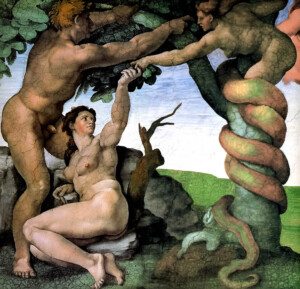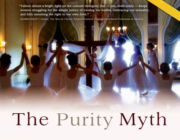Is Pornography or Nudity Bad?
Is Pornography or Nudity Bad/Evil?
This is a very interesting question which I’v been wanting to write a blog post on for a long time. I believe the answer to this question reveals the root of sexual desire and addiction in our society. With the almost inescapable presence of nudity and sexuality in TV, Music, Internet, Public Places it is a moral question that most individuals in our society must decide for themselves, and a conversation that is being neglected both within ourselves, our families and our religions. I find it interesting because it has been made so complicated by Western Culture, Western Christianity, American Culture and thus Mormon culture as well. It is further complicated by widespread reproach of “pornography” without really even defining what pornography is. I believe this practice is causing widespread addiction and psychological issues in our culture (especially among religious youth) which results in real negative effects on both love and marriage between the sexes.
First off, Let me disclose that this article is coming from an individual that was raised a very active religious Christian (LDS). Also, I think that hopefully all reading this article can start by agreeing that there is nothing innately evil about sexuality or the human body. The body in both its male and female forms is a beautiful perfect creation of God unrivaled by any human work of art or science. The question therefore (for me at least) is not so much ‘is the nude human body bad’, the question is ‘when is it appropriate for the nude human body and its various functions to be seen’? The same for sexuality. When does nudity become pornography? When does sexual activity become bad? What are the consequences of nudity, and which aspects are socially harmful or helpful?
 Now that we’ve asked the right question lets begin the discussion on this highly polarized issue. And let me start with my thesis, that there is no universal answer for this. Or in other words, the answer is not a black and white issue of “good” and “bad” and varies depending on the age and physical/spiritual maturity of the individual. To illustrate perhaps we can pose a number of questions for the reader to ponder before discussing further. Some should be easy to answer and some more difficult, but in all of them it might help to think about how others with a different culture or viewpoint might answer. Pay close attention to condemnation, judgement or justifications you find yourself making. Does just the thought of asking the question make you angry or defensive? Are you coming to your answer from a place of love or reaction? What are your beliefs based on? Are the beliefs of others invalid? As you try your best to honestly ask and answer these questions and pay close attention to your emotional reactions, you may find you learn a lot about yourself…
Now that we’ve asked the right question lets begin the discussion on this highly polarized issue. And let me start with my thesis, that there is no universal answer for this. Or in other words, the answer is not a black and white issue of “good” and “bad” and varies depending on the age and physical/spiritual maturity of the individual. To illustrate perhaps we can pose a number of questions for the reader to ponder before discussing further. Some should be easy to answer and some more difficult, but in all of them it might help to think about how others with a different culture or viewpoint might answer. Pay close attention to condemnation, judgement or justifications you find yourself making. Does just the thought of asking the question make you angry or defensive? Are you coming to your answer from a place of love or reaction? What are your beliefs based on? Are the beliefs of others invalid? As you try your best to honestly ask and answer these questions and pay close attention to your emotional reactions, you may find you learn a lot about yourself…
Questions to think about
-What effect does teaching youth that nudity is “bad” have on people as they grow older?
-Is it good/bad to see your own baby/young children naked? How about someone else’s baby? Is that pornography? When does it become pornography?
-Is it good/bad to post such picture where anyone could see them? (ie. the internet)
-Is it good/bad to look at one’s self naked? When does this become “bad” or negative?
-At what age does this change and what was once “OK” become “bad”?
-Is it good/bad for cultures to encourage group bathing? (Such as high school showers in gym class)
-Among what ages is this appropriate? (Many cultures have/do have public bath houses for adults)
-Is it appropriate to have group bathing between the sexes?
-Is it appropriate for family members to have group bathing between the sexes? At what age does “OK” become “bad”?
-Is it good/bad for cultures to use nudity in social art or iconography? (nude sculptures, nude paintings, nude pictures, nudity in theater)
-Are native cultures where it is the “norm” to be naked or topless “bad”? Does it have negative effects? Do these “bad” social behaviors stop when the culture is taught to cover its skin?
-What is it that makes nudity become sexually charged? Is this cultural?
-Are the observed negative effects of nudity greater in areas where nudity is socially acceptable than in areas where nudity is highly unacceptable and prohibited (Islamic Nations vs. Brazil or Europe)?
-Are women or men happier and more free in cultures where they are encouraged to cover all skin, than those where it is socially acceptable for them to be naked or nearly so?
-Is there a middle ground between total coverage of the body, and total nakedness that is more or less socially harmful/helpful?
-What are the effects of sexual depictions on a culture? Is there less sexual abuse in cultures where depictions are repressed?
-How does widespread nudity or nude depictions affect people psychologically and emotionally?
-Is the effect different for girls than for boys?
-How does widespread repression of nudity or nude depictions affect people psychologically and emotionally?
-What are the effects of sexual depictions on youth? Are some sexual depictions educational and helpful and others negative and harmful?
-What is the role of sexual depictions in sexual education?
-If a youth walks in/sees their parents having sex is it psychologically harmful, helpful or neither?
-Are the effects of seeing sexual content more or less harmful/helpful than seeing violent content?
-Is it worse to see a depiction of murder/violence or sex in a picture, movie or video? Why?
-Is there a difference between a sex of love and a sex of lust? Does viewing depictions of these have differing effects on individuals?
-Is there a “best” sexual behavior or attitude for an individual? If so, is it possible that there are those who only know “lustful sex” who would benefit from seeing “loving sex”? What is the best way for such things to be learned/taught?
-Is there an educational value of sex? What is the purpose and value of sex? Does it have multiple values? Are its values different to different people or people in different circumstances?
-How common are marriages and relationships where one or both partners are sexually unfulfilled?
-Do sexual depictions in society hurt or help these individuals? Which types of depictions have which effects?
-Are sexual depictions always bad and always harmful to relationships?
-What makes them harmful or helpful?
-Is it true that individuals who have deeply held beliefs that sex, nudity or sexual depictions are inherently bad, seem to be the ones with the greatest appetites and addictions to such material?
-What is the best balance between sexual repression and sexual freedom?
My Thoughts
I think people will benefit more from just personally pondering and discussing these questions with parents, spouses, families than any amount of advise I or a church could offer. As Iv asked myself the above questions over time, and observed how my own views have changed over time, I now see how complicated this issue can be, and how there is no one answer. How what was right for me in youth was different than what is right as a single adult or as a married adult. And now as a parent I must contemplate how to advise my children in this issue.
I think one of the greatest aids in helping me wrap my head around these moral questions religiously has been the religious symbol of the garden of Eden and fall/redemption of man. I think that even for secular individuals, this story can be seen as an allegory for the evolution/progression of man kind over time, or simply the raising of a child to adulthood.
Thus in religious iconography women wear a “veil” during the marriage ceremony, symbolizing the “veil” existing between mankind and God or the Spirit/unseen world. Or perhaps the veil that separates an innocent child from the realities of the world they are raised in.
As the bible says, man is to woman; as Christ is to his Bride (the church/saints, Eph. 5:22–32, Rev 21:2–9, D&C 33:17, D&C 65:3; D&C 133:19). In the biblical creation-drama Man was once one with God, but took on mortality and was “clothed” or “veiled” in flesh. Even then he was naked and innocent. Adam and Eve didn’t think about whether nudity was Good or Bad, because duality/division caused by law (tree of knowledge) had not been introduced into the world. One could compare this to a child or even many indigenous cultures, living naked and behaving instinctively. But like animals, in their innocence there was little happiness or misery nor pain and pleasure. To progress to a higher state they would have to be educated.
 This is symbolized by the partaking of the fruit of the knowledge of good and evil, which specifically is symbolic of the introduction of cultural, political law, mores and values (civilized behavior controls placed upon man by higher beings). I believe the garden drama is symbolically pointing to the existence of dual paths of education which have been discovered and used by the higher beings which guide us. These dual paths of education are first education through pure trail and error, and second education through teaching/ruling. The first path is the one initially ordained for mankind (Adam & Eve) by God, where they were placed in a paradise garden/earth with no other instruction or rules (other than to procreate & be happy). Through this path mankind would learn very slowly through limited experience but with constant access to God’s wisdom. However, a second path was offered by the serpent, who symbolizes beings who are close to the earth and prone to meddle in its affairs. This path was to get knowledge all at once through teaching done by the serpent (symbolized by his giving them the fruit of the knowledge of good and evil). This is the equivalent of a loving parent with a ‘hands-off’ learn as you go approach, verses a very controlling, highly regulating parent who creates strict regulations for all anticipated behavior and expects strict obedience. I think this interpretation has ample support from Paul’s lectures in the new testament on the effects of the “law”. (see my post on this for a full scripturally supported explanation).
This is symbolized by the partaking of the fruit of the knowledge of good and evil, which specifically is symbolic of the introduction of cultural, political law, mores and values (civilized behavior controls placed upon man by higher beings). I believe the garden drama is symbolically pointing to the existence of dual paths of education which have been discovered and used by the higher beings which guide us. These dual paths of education are first education through pure trail and error, and second education through teaching/ruling. The first path is the one initially ordained for mankind (Adam & Eve) by God, where they were placed in a paradise garden/earth with no other instruction or rules (other than to procreate & be happy). Through this path mankind would learn very slowly through limited experience but with constant access to God’s wisdom. However, a second path was offered by the serpent, who symbolizes beings who are close to the earth and prone to meddle in its affairs. This path was to get knowledge all at once through teaching done by the serpent (symbolized by his giving them the fruit of the knowledge of good and evil). This is the equivalent of a loving parent with a ‘hands-off’ learn as you go approach, verses a very controlling, highly regulating parent who creates strict regulations for all anticipated behavior and expects strict obedience. I think this interpretation has ample support from Paul’s lectures in the new testament on the effects of the “law”. (see my post on this for a full scripturally supported explanation).
Suffice it to say, all political and religious structures on earth fall on a continuum somewhere between these two extreme systems. But for the most part man has chosen to consume knowledge from each-other and the lower beings who slither close to the earth, and an inescapable side-effect of this system of “civilizing of man” was the division of mankind’s psyche into ‘good’ and ‘evil’. This is seen religiously as the creation of heaven and hell, especially in the after life. So the introduction of “law” in society and religion tells mankind what is “good” and “bad” introducing the physiological/spiritual divisions of guilt and self-righteousness into society. It seems to me that even without any programming from cultural or religious law, our own consciences cause sex to be a polarizing activity. Sexual depictions tend to lead to sexual acts and sexual acts tend to unite when done from a place of love and unselfishness, or divide individuals and leads to hurt and hate when done from a place of lust and selfishness. Perhaps more than any other activity, sex gives people a knowledge of the effects of our interpersonal actions, especially in regards to selfishness and unselfishness. But religious and cultural law adds another whole dimension of difficulty to unraveling the vast knowledge to be gained in sexual experience.
The complexities of these ‘difficulties’ deserves a post of its own as well, but in short, by labeling certain sexual BEHAVIORS as ‘good’ and others as ‘bad’, we mask the more subtle and yet more important physiological aspects of sex which revolve around INTENT.
And so back to the question, is sex or nudity evil? Since the fall of man, man and low spirits have intentionally or unintentionally answered this question with the regulations, laws and rules they have created to control it. But I believe the true answer is a difficult one, because it is different for every individual. I believe consciousness is divided into two camps of selfish and unselfish intent or service. And the morality of sexual depictions or sex itself must be answered in terms of its selfish or unselfish influence on individuals and society. I believe sex is a powerful act that can redeem us from duality (through unselfishness), or it can drive us further into it (by lust/selfishness). Thus sex and nudity even for “married” people can be an act of selfishness, and therefor “wrong”. As one looks at another’s naked body, which is a perfect symbol of God or the divine in all of us, we must ask ourselves if we are worthy? It is love/selflessness that makes us worthy. Do we love this person or are we using them for our own pleasure and self-gratification. For the masculine sinner, do we wish they looked different than they do? For the feminine sinner, do we desire them to desire/”love” us differently than they are able? Do we prefer one body type over another? One breast size over another? One character trait over another? All of these traits are not giving/loving in nature but desiring/taking and lustful. Are we thinking about how they feel or how we feel? About how we can serve or be served? A great teaching on this is found in an Apocryphal teaching of Jesus…
THE law forbids adultery; but in the eyes of law adultery is an overt act, the satisfaction of the sensuous self outside the marriage bonds.
2 Now, marriage in the sight of law is but a promise made by man and woman, by the sanction of a priest, to live for [ever] in harmony and love.
3 No priest nor officer has power from God to bind two souls in wedded love.
4 What is the marriage tie? Is it comprised in what a priest or officer may say?
5 Is it the scroll on which the officer or priest has written the permission for the two to live in marriage bonds?
6 Is it the promise of the two that they will love each other until death?
7 Is love a passion that is subject to the will of man?
8 Can man pick up his love, as he would pick up precious gems, and lay it down, or give it out to any one?
9 Can love be bought and sold like sheep?
10 Love is the power of God that binds two souls and makes them one; there is no power on earth that can dissolve the bond.
11 The bodies may be forced apart by man or death for just a little time; but they will meet again.
12 Now, in this bond of God we find the marriage tie; all other unions are but bonds of straw, and they who live in them commit adultery,
13 The same as they who satisfy their lust without the sanction of an officer or priest.
14 But more than this; the man or woman who indulges lustful thoughts commits adultery.
15 Whom God has joined together man cannot part; whom man has joined together live in sin.
But this ideal of perfect selfless love can rarely be fully achieved in this fallen world of duality (not to say we shouldn’t get married, but that most marriages in this life fall short of true love which is our goal)… we can search our souls to discover how close we’ve come, by whether the thought of such a situation brings thoughts of fear/desire, pleasure/pain or possession/divorce. This would include thoughts of division which classify some as preferable or ‘beautiful’ and others less-preferable and thus less attractive. Fears of infidelity or the desire that one’s partner desire them and only them. As perfect love casts out all fear, fear never comes from a place of true love. So many pretend they are ‘in love’ and above lust, but their love is partial if they are respecters of persons and do not show the same respect for all colors, body types and personalities. Would your desire for your partner remain unchanged regardless of whether they were physically attractive or not? Would your love for your husband remain the same regardless of whether he loved you back or desired others? I think that sexuality and nakedness in our western media is pretty strongly fueled by lust and likely is contributing to division and spiritual fall or decline. But perhaps it is our distorted view of the appropriateness/inappropriateness of sex that is the root cause of this, not the other way around.
True love is an easy enough ideal in the theoretical world, but hard to apply to daily life. But we may begin by accepting that there is no “one size fits all” law, solution or doctrine of achieving it. As to the solution for “pornography” in our culture and whether its bad, i beleive we should be open to the possibility that for some, perhaps it would benefit them if there were more nude pictures of “unattractive” body types. I certainly think that its possible that much more public breast feeding would be a great benefit to the sexual health of the youth of society (reminding young men what breast where created for). Perhaps it would benefit many youth to walk in on their parents sex so they can be reminded of what sex is for and what love creates! For some it may even be necessary for them to be given a little time to “sow their wild oats” and go after their sexual fantasies long enough to realize they are illusions which will never fulfill like the true love we are all seeking. For some, pornography may be a better way to accomplish that than a bout of true promiscuity. It is obvious that the current culture is lustful, unbalanced and divisive. I think balanced is the key here, because it seems to me the religious who demonize “unsanctioned” sex are often just as selfish and to blame as the promiscuous. It is obvious that the western culture has distorted human sexuality (by clothed pictures and media, as much as naked ones!) Just look at how many of our young men and especially women feel bad about the way they look and want to surgically change themselves? And it is possible that teaching the youth “don’t look at what your culture is telling you is beautiful… because in truth it’s evil!” actually does more harm than good. That it actually fuels addiction. How many religious leaders out there are counselling their youth and congregation about the evils of pornography while they themselves were sure to find women that met the status-quo of beauty or have wives with cosmetic surgery or breast implants? I’m not saying those individuals are bad, but that its quite frankly hypocritical for one to preach the lustfullness of internet nudity while they lust for beauty in their own marriage. How many parents or even spouses teach or desire lust within marriage while saying how evil it is outside of marriage? Well we’ve got to draw the line somewhere we might say… and perhaps that’s true; but lust (which is defined as possessive sexual desire) is still lust and it is in opposition to love (which only gives), so we shouldn’t judge too harshly when some people have trouble lusting only in the way society or our religion expects them to.
True righteousness is a difficult target to hit. Its a delicate balance, a challenging dance. As one quote puts it…
17 There are no rules that can apply to all, for men are specialists in sin; each has his own besetting sin,
18 And each must study for himself how he can best transmute his tendency to evil things to that of righteousness and love.
19 Until men reach the higher plane, and get away from selfishness, this rule will give the best results:
20 Do unto other men what you would have them do to you.
I think we should talk to our partners and children openly, often and personally, drawing from personal experience and gained wisdom instead of just rehashing religious or cultural ‘standards’. If we or our child has problems with sex or pornography or becomes addicted it is quite often childhood experiences, or even parents or spouse’s own unbalanced sexuality, guilt and beliefs at the root of it or keeping them from progressing past it. We may need to sit down with our children and look at picture after picture of “real” nude people in order to purge them of the false conceptions and guilt that is fueling their desire. (see this interesting study) We might just need to sit down and talk through all the difficult questions until we see how our own lust or family problems have been projected upon them and caused them grief. We might just need to understand and love them and show a better example of love to them. I have certainly never met an individual who overcame addiction through strong-arming themselves or simply “willing” change. That’s like a dictator who thinks he can eradicate evil in society by repression and incarceration… it does not heal people, and it usually creates more evil and selfishness than it eradicates. I do not believe there are any easy answers concerning the “good” or “bad” of nudity or pornography. It is not a black and white issue, but a symbol of our own progress in seeing or understanding God, each-other, our own unity and our journey back to oneness with Him.
Let me conclude in reiterating the idea that talking to those we love about sex, nudity or pornography is far more beneficial than anything I could share on the subject. But I offer my above opinions in hopes that they might prove useful to someone… I’ve found it’s difficult to share discuss these types of topics in groups, because every member of any audience is in a different place in their own personal progression or evolution. Everyone attaches different meanings to words like love, lust, sex and selfishness. We all learn in our own unique ways. So I encourage consistent one on one discussion concerning these important concepts, instead of black and white dogmas, when it comes to gaining understanding about pornography or the place of sexual media in society generally.





Pornography is BORING!!!
The only thing pornography ever shows is ABUSE of women! It doesn’t show loving romance, people touching/caressing each other in a sensual, loving way! Porn shows people grabbing and abusing one another in an abusive and potentially harmful way! The most common things shown in porn are pinching/pulling of the female nipples as if trying to tear them off, guys grabbing womens’ breasts as if trying to pop them like balloons, and then it’s boom! boom! boom! boom! boom! into her rear for like 5 to 10 minutes.